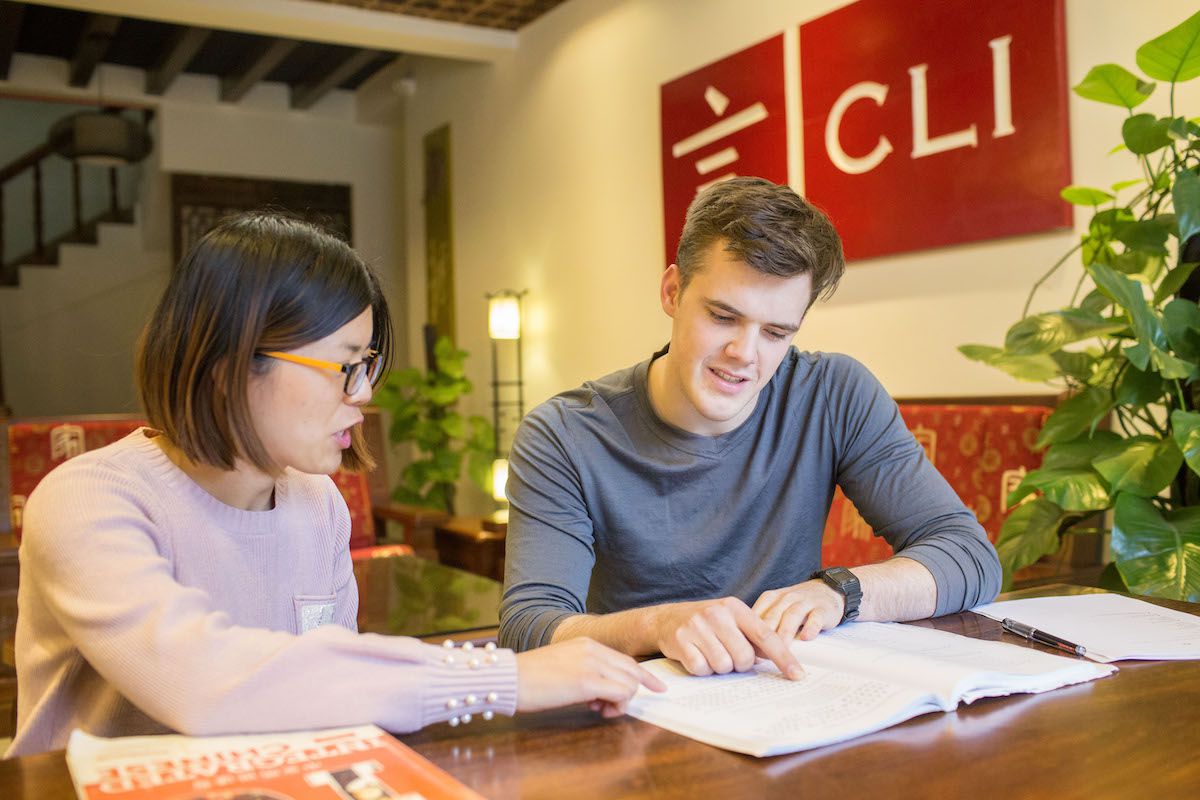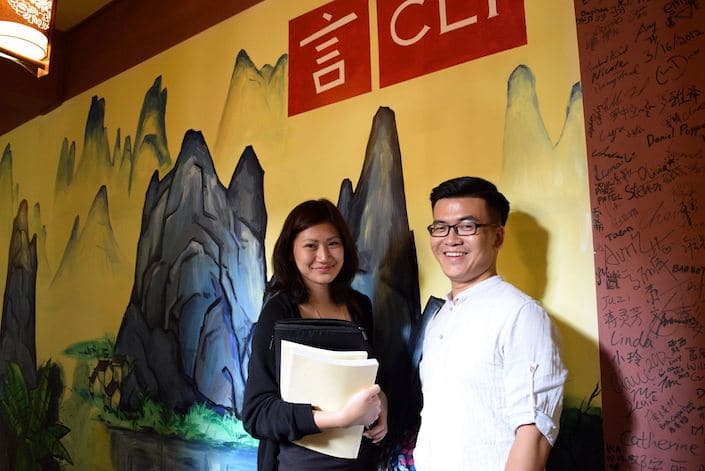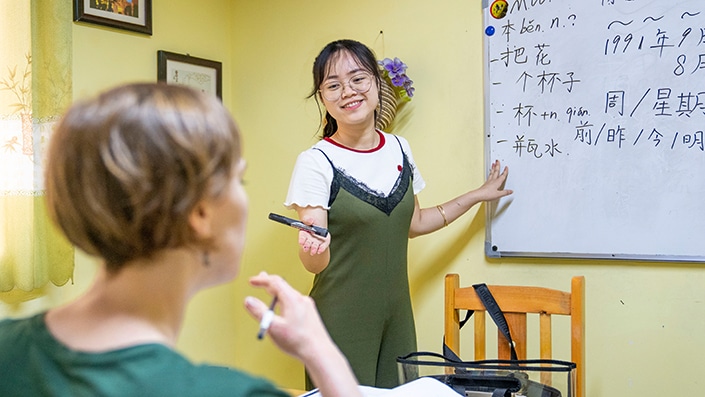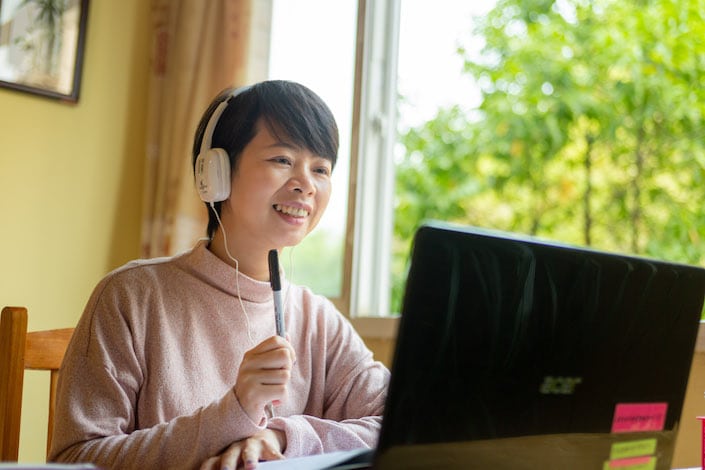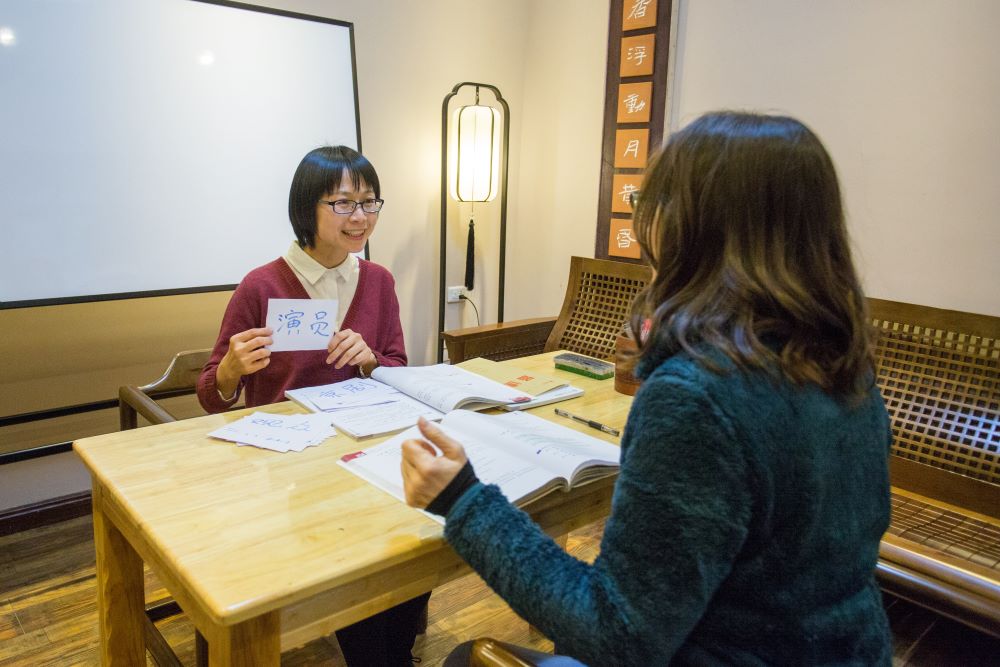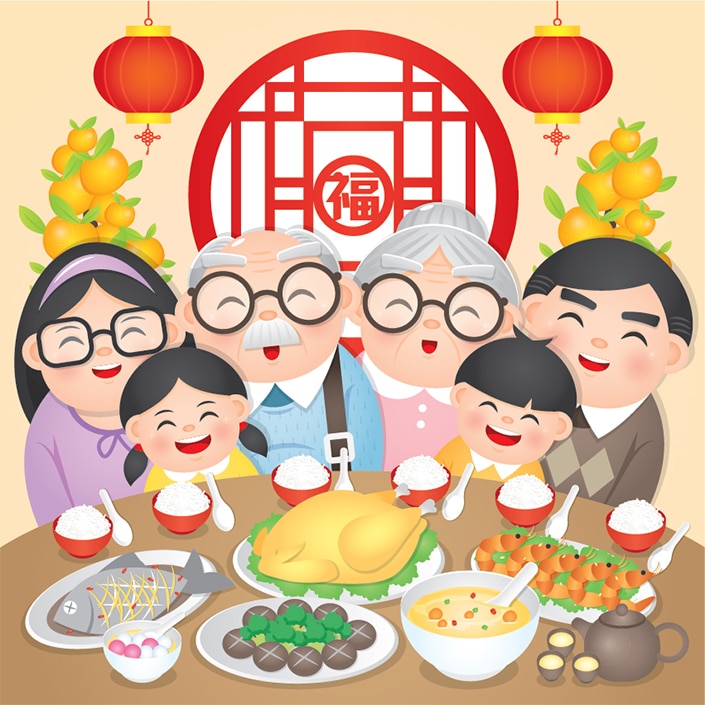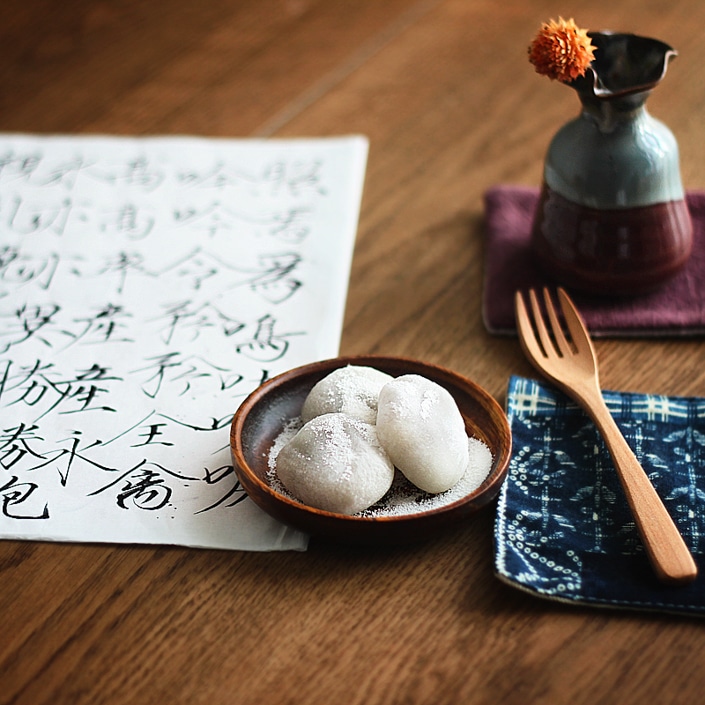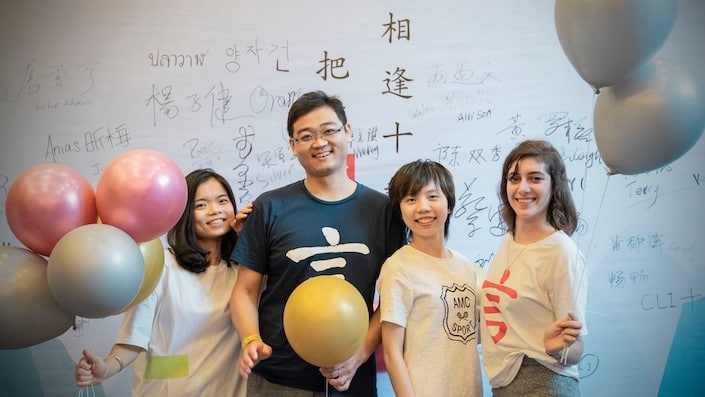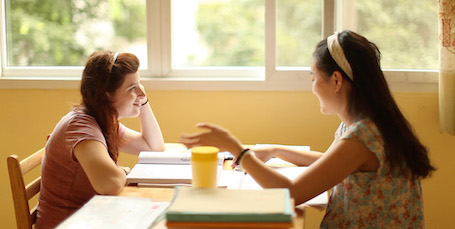12 Common Ways to Say “Hi” in Chinese
Learn Chinese in China or on Zoom and gain fluency in Chinese!
Join CLI and learn Chinese with your personal team of Mandarin teachers online or in person at the CLI Center in Guilin, China.
One of the first things students learn when studying Chinese is how to greet people. Invariably, they're taught that to say "hi" in Chinese, they should say 你好 (🔈 nĭhǎo).
But “Nĭhǎo” is only one of many greetings. In most cases, it's not even the most common! Read on to discover more ways to say to “hi” in Chinese.
Table of Contents
- 12 Common Ways to Say “Hi” in Chinese
- 1. 你好 | Nĭhǎo | Hello!
- 2. 您好 | Nínhǎo | Hello (polite)
- 3. 大家好 | Dàjiā hǎo | Hello everybody!
- 4. 老师好 | Lǎoshī hǎo | Hello, teacher!
- 5. 下午好 | Xiàwǔhǎo | Good afternoon!
- 6. 晚上好 | Wǎnshànghǎo | Good evening!
- 7. 早 | Zǎo | Good morning (informal)
- 8. 喂 | Wéi | Hello (used when answering the phone)
- 9. 你吃了吗 | Nĭ chī le ma? | Have you eaten?
- 10. 嗨 | Hāi | Hi!
- 11. 嘿 | Hēi | Hey!
- 12. 哈喽 | Hālóu | Hello!
- Chinese Vocabulary: How to Say Hi in Chinese
- Bringing it all together
12 Common Ways to Say “Hi” in Chinese
1. 你好 | Nĭhǎo | Hello!
你好, or “nĭhǎo” in pīnyīn, is the greeting most commonly taught in beginner Chinese textbooks.
Composed of the characters for "you" (你 nĭ) and "good" (好 hǎo), it literally means “you good.” If you're a beginner, you can’t go wrong with 你好 nĭhǎo for "hello."
But if you pay attention to how Chinese people greet each other, you usually won't hear “你好.” This is because 你好 is a somewhat formal greeting.
In fact, 你好 isn't normally used among friends. The most common situation in which native Chinese speakers use this word is when meeting someone new.
你好 is also occasionally used as a written greeting from a superior to a subordinate. Keep in mind, it does sound somewhat formal compared to many of the other more common greetings introduced below.

Knowing a variety of different ways to say "hi" in Chinese will ensure that you're prepared for every situation.
2. 您好 | Nínhǎo | Hello (polite)
Many beginning students of Chinese will have learned that the formal way to say hello is 您好 (nínhǎo). If you're new to Chinese, you can remember that 您好 is used to show respect by noticing that the only difference between 你 and 您 is that the 您 in 您好 has 心 (xīn), the Chinese character for heart, underneath it.
This detail can be thought of as indicating that 您好 is more heartfelt or sincere.
The best time to use this greeting is when you're meeting a person who's substantially older than you, a teacher, a superior or an important person. It can also be used to address someone to whom you otherwise want to show respect for the first time. You can also use 您好 in written form as a greeting in more formal correspondence.

Hello from Guilin!
3. 大家好 | Dàjiā hǎo | Hello everybody!
If you're looking for a way to greet a group of people, you've found it in “大家好” (dàjiā hǎo). 大家 means “everybody” or “everyone” in Chinese, so this greeting literally means “everyone good.”
More accurately, though, it can be translated as “hello everybody.” This is a great greeting with which to address a group.
If you continue reading, you'll soon notice many Chinese greetings can be created by adding 好 after other characters that represent either the person or people you want to address. This is the case with 大家好.
Greetings are also frequently created by adding 好 after characters representing a time of day. One example of this is the phrase 下午好 (xiàwǔhǎo, or “Good afternoon”), discussed below.

As a student in China, knowing how to say "hello teacher" in Chinese is an essential skill.
4. 老师好 | Lǎoshī hǎo | Hello, teacher!
If you're studying Chinese, you can consider greeting your teacher by saying 老师好 (lǎoshī hǎo). Translated literally, this phrase means “teacher good,” but it actually means “Hello, teacher.”
This greeting follows a pattern that's similar to 你好 (nĭhǎo) and 大家好 (dàjiā hǎo) above. To construct it, first write the characters for the person you wish to address, in this case, your teacher, or 老师. Then, add 好.
In the United States, teachers are addressed just like everyone else using a combination of their titles and last names. In China, however, it's common to call teachers 老师. As a matter of fact, most Chinese people greet those who work as teachers with 老师好 even if they're not their teacher.
The Confucian tradition still has an outsized influence on modern Chinese society. As a result, education is considered very important and teachers are held in high esteem. People sometimes even refer to those they respect who don’t actually work as teachers as 老师 to show how much they admire them!
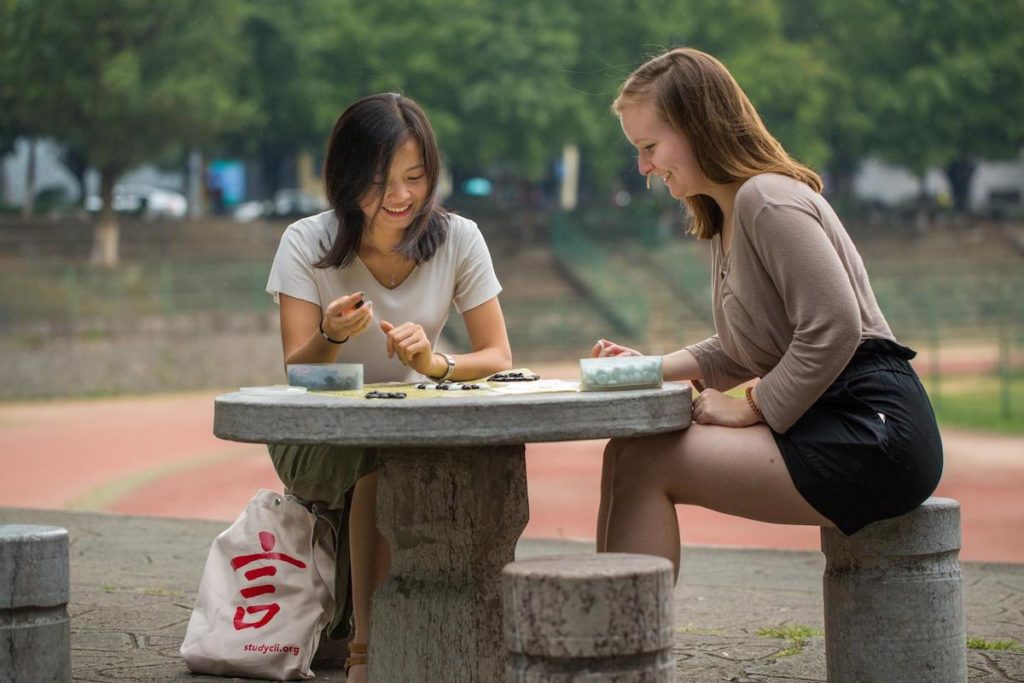
Playing traditional Chinese strategy games like go is a great way to practice your Chinese language skills.
5. 下午好 | Xiàwǔhǎo | Good afternoon!
Another common pattern used to create greetings is to include the time of day when you're meeting the person you wish to greet, followed by 好.
For example, if you're greeting someone in the afternoon, which is 下午 in Mandarin, then you'd say 下午好 (xiàwǔhǎo).
6. 晚上好 | Wǎnshànghǎo | Good evening!
In keeping with the pattern introduced above, if you happen to meet someone at night, you can create a greeting by starting with the Chinese word for night, which is 晚上, and adding 好 at the end. Thus, your greeting becomes 晚上好 (wǎnshànghǎo).
Be careful: the literal translation for this phrase is “night good,” and English speakers may be tempted to reverse the order and assume that this is actually a way to say “good night.” However, this interpretation is incorrect. In English, “goodnight” is not a greeting. Rather, it's a way to say goodbye to someone.
In Chinese, by contrast, 晚上好 (wǎnshànghǎo) means “good evening” and is a greeting, not a way to bid someone goodnight.
If you want to say goodnight to someone in Chinese, you should say 晚安 (wǎn'ān).

Just like English, Chinese has different greetings to use for different times of day.
7. 早 | Zǎo | Good morning (informal)
If you wish to greet someone in the morning, use the word for morning, which is 早上, followed by 好. This produces the common greeting 早上好 (zǎoshànghǎo; good morning). It's also possible to say 早 (zǎo), which also means good morning.
Note that while it's possible to simply say 早 in the morning, shortening greetings in this way doesn't work in other contexts. It's not acceptable to follow this pattern by simply saying “下” for 下午好 (xiàwǔhǎo) or “晚” for 晚上好 (wǎnshànghǎo). Only 早上好 can be shorted this way.
While 早 and 早上好 are both more or less the same, 早 is slightly less formal. You can think of 早 (zǎo) as being similar to the more relaxed English greeting “mornin’.” 早上好, on the other hand, is simply “good morning.”
早 can be used among friends or people you are familiar with. 早上好 (zǎoshanghǎo) is better to use with older people, superiors, or people you’ve just met.
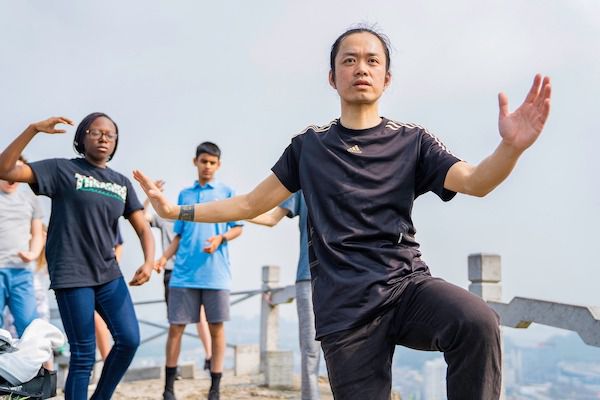
Learning a martial art like tai chi is a wonderful way to gain a deeper understanding of Chinese culture while practicing your language skills.
8. 喂 | Wéi | Hello (used when answering the phone)
喂, or “wéi” in pīnyīn, is a greeting that's exclusively used for answering the phone in China.
In English speaking countries, the greetings used over the phone are usually the same as those used in everyday life. Indeed, most English speakers simply say “hello” when they pick up the phone.
In China, however, it sounds strange to answer the phone by saying 你好 (nĭhǎo). Instead, most people answer the phone by saying 喂 (wéi). Usually, they put extra emphasis on this character’s rising tone, pronouncing it like a single-word question.
If you want to be more polite or you suspect that there's an important caller on the other end of the line, you can also add 你好 (nĭhǎo). However, it sounds more natural to say 喂,你好 (wéi, nĭhǎo) than to simply say 你好 by itself.
Note that many dictionaries present two different entries for 喂, one with a rising tone (wéi) and one with a falling tone (wèi). When pronounced with a falling tone, 喂 can sometimes serve as an interjection used to get other people’s attention. However, it most commonly occurs as a way to answer the phone. In that context, it's pronounced with a rising tone.
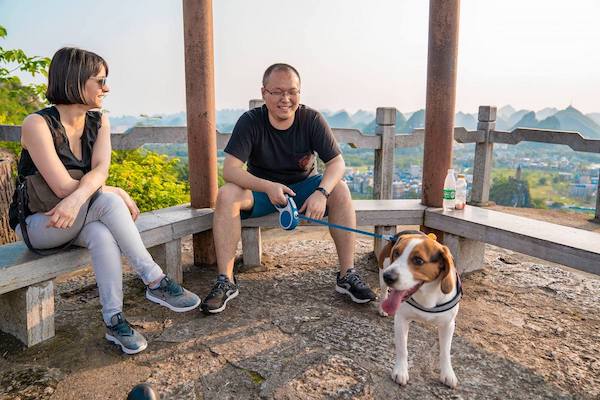
The more ways to say "hi" in Chinese that you know, the more comfortable you'll feel engaging in day-to-day interactions while living in China.
9. 你吃了吗 | Nĭ chī le ma? | Have you eaten?
Beginning students of Chinese are sometimes taught that “你吃了吗?” (Nĭ chī le ma?) which means “Have you eaten?,” is a common greeting in China.
This greeting is less commonly used than you might think, however. Today, it's somewhat outdated, and it's more common to hear it from older people, especially those living in the countryside or in smaller towns.
Young people are very unlikely to greet each other this way. In fact, saying this to anyone except members of the older generations sounds a bit strange in modern China.
This greeting can be confusing, since it sounds like a question that actually requires an answer, much like the common American English greeting “How’s it going?” However, 你吃了吗 isn't meant as an actual question that requires a detailed answer.
Contrary to what many might think, this greeting is not meant as an invitation to a meal. It's simply a polite thing to say. Thus, even if you haven't actually eaten anything, it’s usually easier to reply “吃了,你呢?” (Chī le, nĭ ne?), which means, “I’ve eaten, and you?”
If you answer that you haven’t eaten anything yet, you'll put the person who greeted you in an awkward situation. This is because they'll feel compelled to invite you to eat, an invitation which they'll then expect you to politely turn down.
Keep in mind that this greeting is not normally used upon the first meeting. Usually, you'll only be asked this by people with whom you're already somewhat familiar.
View this post on Instagram
10. 嗨 | Hāi | Hi!
嗨, or “hāi” in pīnyīn, is an informal greeting used by young people in urban areas to greet friends and other people around their age. It's actually a loanword from English and is simply the Chinese form of the English greeting “hi.”
You'll often hear young people greeting other young people this way in person. It's also common to see the written form of 嗨 as a greeting on popular social media platforms like WeChat.

Informal greetings are great for addressing Chinese friends around your own age.
11. 嘿 | Hēi | Hey!
Like 嗨 above, 嘿, or “hēi” in pīnyīn, is a loanword taken from English. It's modeled off of the sound and meaning of the informal English greeting “hey.”
Like 嗨 (hāi), 嘿 (hēi) is often used among young people in urban areas to informally greet friends or other people of a similar age. It can also be used in written form on social media.

Learning both formal and informal Chinese greetings ensures you can interact with everyone!
12. 哈喽 | Hālóu | Hello!
Like 嗨 (hāi) and 嘿 (hēi) above, 哈喽, or “hālóu” in pīnyīn, is a loanword from English. Note that the characters for 哈喽 are sometimes also written as 哈啰.
This greeting is modeled off of the English greeting “hello,” and sounds quite similar. It's also an informal, somewhat playful greeting.
Most commonly, it's used by young urbanites both in person and occasionally online to address their peers.
Chinese Vocabulary: How to Say Hi in Chinese
| Hànzì | pīnyīn | English |
|---|---|---|
| 你好 | nĭhǎo | hello |
| 您好 | nínhǎo | hello (polite) |
| 大家好 | dàjiā hǎo | hello everybody |
| 老师好 | lǎoshī hǎo | hello teacher |
| 下午好 | xiàwǔ hǎo | good afternoon |
| 晚上好 | wǎnshàng hǎo | good evening |
| 早 | zǎo | mornin' |
| 喂 | wéi | hello (when answering the phone) |
| 你吃了吗 | nĭ chī le ma | have you eaten? (used as greeting) |
| 嗨 | hāi | hi (loanword from English) |
| 嘿 | hēi | hey (loanword from English) |
| 哈罗 | hāluó | hello (loadword from English) |
| 问好 | wènhǎo | send one's regards to |
| 打招呼 | dǎzhāohu | to greet / to notify |
Bringing it all together
Watch this short video to learn how to pronounce several of these greetings and discover some others not mentioned above. If you're interested in learning to write the Chinese characters for Chinese greetings, consider using Skritter to practice.
After greeting someone new, you'll need to know how to introduce yourself. To do that effectively, you'll need to know how to say your name in Chinese. And of course, if you really want to impress your new friends, you should work with a Chinese teacher either online or in person to pick out a whole new, culturally appropriate Chinese name for yourself.
When meeting and greeting new people, it’s also important to gain familiarity with the Chinese rules of etiquette. Brush up on the above vocabulary and pay attention to the basic Chinese rules of politeness and you will be greeting people in China like a pro before you know it!
Interested in expanding your mastery of basic Chinese a bit further? Check out our articles on 10 common ways to say "no" and "yes" in Chinese or explore our list of the 100 most common characters to continue learning!

Studying Chinese in China is the best way to take your Chinese skills to the next level.

Anne Meredith holds an MA in International Politics and Chinese Studies from the Johns Hopkins School of Advanced International Studies (SAIS). As part of the graduation requirements for the program, Anne wrote and defended a 70-page Master's thesis entirely in 汉字 (hànzì; Chinese characters). Anne lives in Shanghai, China and is fluent in Chinese.






